BallaTheFeared
Diamond Member
- Nov 15, 2010
- 8,115
- 0
- 71
It sounded like my 470 at 70% or higher, but worse because it had a drumming sound from poor quality components.
It sounded like my 470 at 70% or higher, but worse because it had a drumming sound from poor quality components.
Yes, that's exactly how videocards work on air cooling. With additional overclocking, power consumption increases, which adds even more strain on the cooling system. Start with a loud reference design compared to after market versions (MSI TwinFrozr, Sapphire Dual-X, MSI Lightning, Asus DCUII), add 80-100W more power with overclocking (with a possible voltage bump) and you get an even louder reference designed 7970. Please go read some HD7970 GE reviews if you don't believe me. There are about 20-30 on the Internet and everyone says that a 1050mhz HD7970 reference is a jet engine. Even our very own AnandTech has the data:
Maybe you don't consider 60+ dB to be loud?
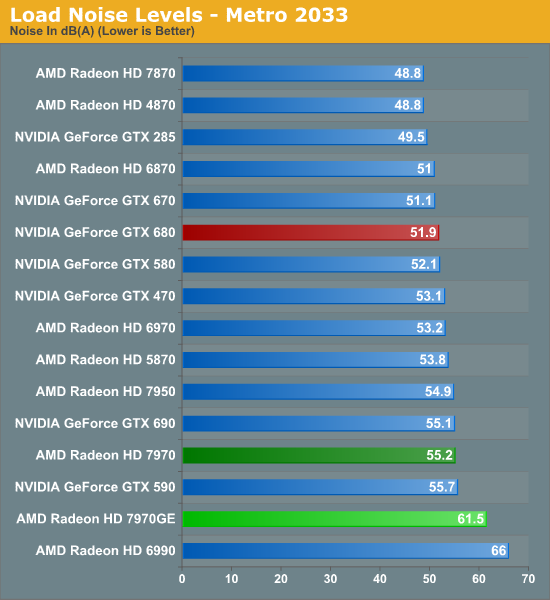
Here is even a video just for you confirming 60+ dB:
http://www.computerbase.de/artikel/grafikkarten/2012/test-amd-radeon-hd-7970-ghz-edition/8/
At 1200mhz, reference HD7970 becomes the 2nd loudest videocard on AT's list:
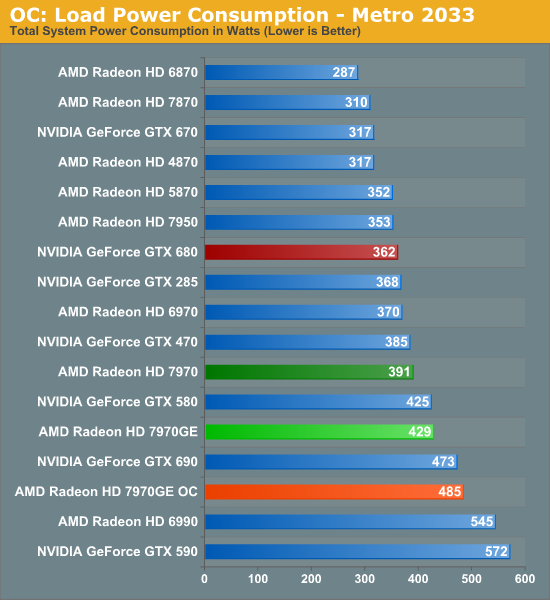
Power consumption skyrockets which exactly explai.s why the reference fan has to work that much harder, which directly contributes to additional noise levels:
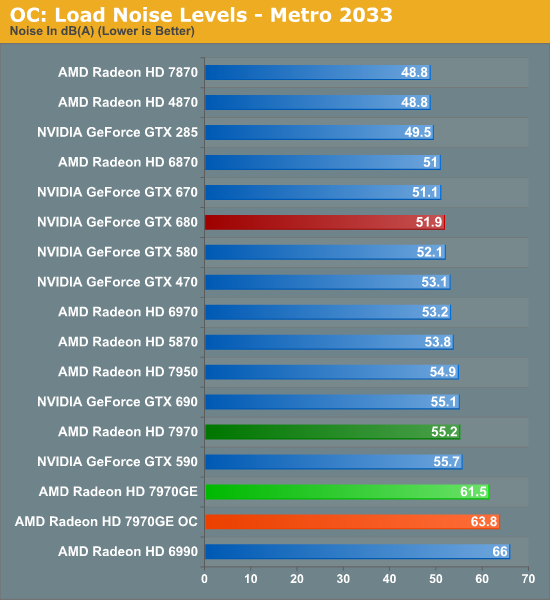
I guess AnandTech, Computerbase, TechPowerUP, etc. are all wrong.....
This happens a lot actually. All the information that 99% of the world sees is there and you come in and say it's wrong and provide nothing to support your view. Just opinion with no data, but always an implication that your one off example is actually representative and the rest of the world is "testing it wrong" or using "questionable methods", etc. So, yes, HD7970 reference design is a loud videocard in overclocked states, shown by 99e25 of the world, except you want to ignore this. I even remember you were one of the few who said HD7970's reference blower was improved from HD6970 design and every single review on the Internet has proven that to be incorrect. Also, HD7970 uses up more power than an overclocked 6970/5870. It's just common sense that the blower would be struggling even more than it did on the 5870/6970, which would inevitably make a reference OCed 7970 louder than 5870 or 6970.
Ok So the take home message for me, a potential buyer, is that at the same price a custom GTX 670 is a better buy than a reference 7970?
But this doesn't really relate to my original question which is a custom cooled Gigabyte 7950 a better buy at $350 than a reference 670 @ $410 or custom 670 @440?
Energy consumption will be a non-issue. I spend more than half my time away with work. When I am away it will either be off, idling or even better with the ATI card on long idle. The difference in power consumption between a 7950 and 670 for me won't be and issue. Heat on the other hand may well be as it gets over 40 Celsius in summer where I live and AC is only so good. I guess I will just have to drop it back to stock clocks then.
Energy consumption will be a non-issue. I spend more than half my time away with work. When I am away it will either be off, idling or even better with the ATI card on long idle. The difference in power consumption between a 7950 and 670 for me won't be and issue. Heat on the other hand may well be as it gets over 40 Celsius in summer where I live and AC is only so good. I guess I will just have to drop it back to stock clocks then.
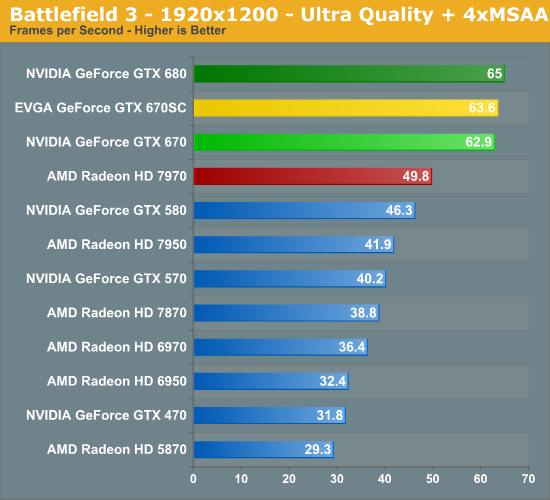
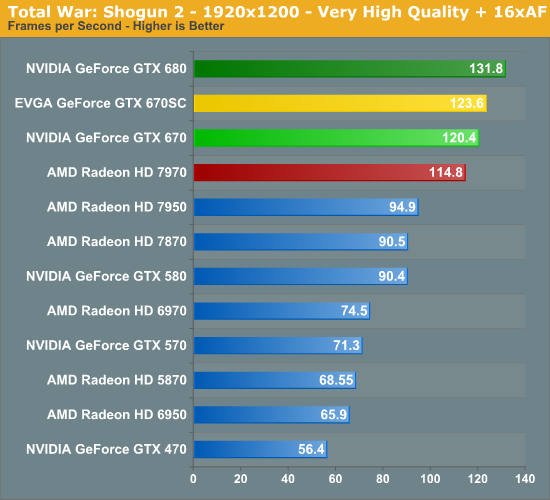
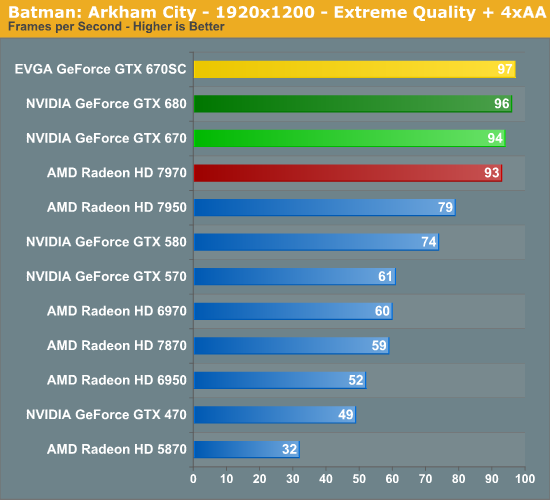
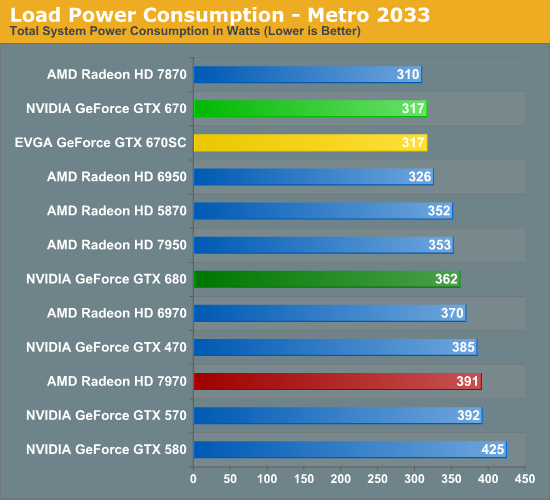
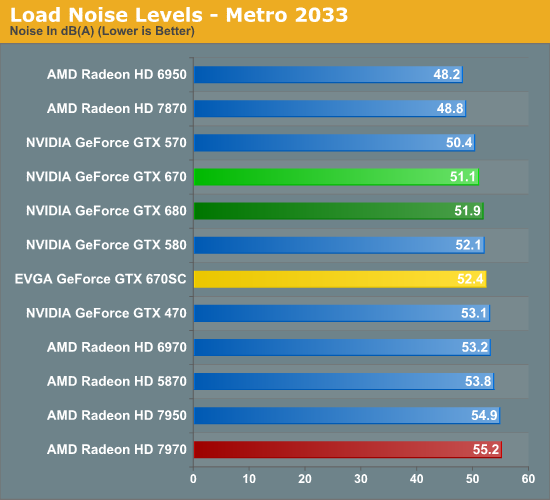
I don't think the 670s performance alone justifies it's cost over the 7950. The question you need to ask yourself is if the additional benefits of the card are worth the extra cost. Some say no, some say yes, the choice in the end is all yours.
At 1080p the 670 is a stronger card, it's better than the 7970 at that res.
Huh?
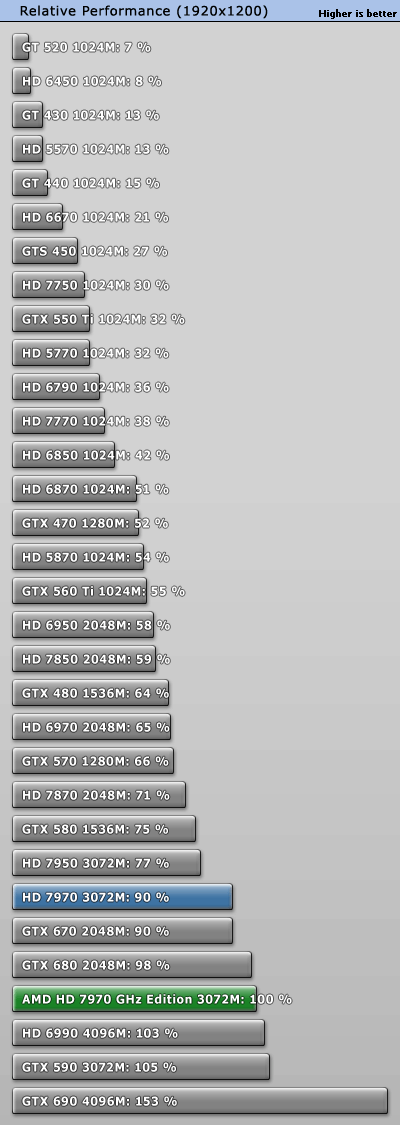
Huh what?
Why are you linking hurricane force wind edition reviews anyways?
I didn't say faster, I said stronger, in which I meant it offered it's best perf/watt perf/dollar at that resolution against the 7970. When you bump up to 1600 the 7970 pulls noticeably ahead performance wise. However let me attempt to clarify once again, stronger not faster, simply put the 670 is a far better solution for 1080 gaming than the 7970. Offering both percent difference in performance, considerable perf/watt advantage, noticeably better perf/$ and lower operating noise.
I used stronger to avoid narrowing down a situation with many factors into one single factor.
Agreed with this. Wouldn't say its stronger, just an overall better card due to perf/$ and perf/w. 7970 and 680s are NOT good cards considering the tier below them can run at identical clock speeds and get within a few % perf while being much cheaper and consuming less power.
So what? Many people don't care about bitcoin mining all day.
These cards, as they are being discussed are gaming cards.
For $400 the GTX 670 is quite a deal. I wouldn't touch a 7950 with a 10 foot pole, and if you gave me one I'd sell it and use it toward a 7970 or GTX670 and if I cared much about power consumption the 670 would be it. That's just me.
I didn't say faster, I said stronger, in which I meant it offered it's best perf/watt perf/dollar at that resolution against the 7970. When you bump up to 1600 the 7970 pulls noticeably ahead performance wise. However let me attempt to clarify once again, stronger not faster, simply put the 670 is a far better solution for 1080 gaming than the 7970. Offering both percent difference in performance, considerable perf/watt advantage, noticeably better perf/$ and lower operating noise.
I used stronger to avoid narrowing down a situation with many factors into one single factor.
For gaming, HD7950 MSI TwinFrozr for $320, Gigabyte WindForce 3x or something like PowerColor PCS+ 7950 (amazingly quiet) are outstanding values. There is 1 area though where HD7970 trounces the 7950 and it's compute. Distributed computing or bitcoin mining, the 7950 can't touch it. Many compute programs scale 100% with the added shaders. There are reasons to get a 7970 for people who actually use the compute functionality of the GCN architecture.
So what? Many people don't care about bitcoin mining all day.
These cards, as they are being discussed are gaming cards.
For $400 the GTX 670 is quite a deal. I wouldn't touch a 7950 with a 10 foot pole, and if you gave me one I'd sell it and use it toward a 7970 or GTX670 and if I cared much about power consumption the 670 would be it. That's just me.
GTX 670, but not the ones you listed.
Get this for 400 instead:
http://www.amazon.com/ASUS-GeForce-G...ata/B0081IFO2C
So what? Many people don't care about bitcoin mining all day. These cards, as they are being discussed are gaming cards.
Ok So the take home message for me, a potential buyer, is that at the same price a custom GTX 670 is a better buy than a reference 7970?
It brings additional features, such as CUDA simulation, TXAA, PhysX, Adaptive Vsync, top of the line Driver support, and a top notch user interface. Nvidia also offers a better solution should the need for multi-gpu arise down the road.
I don't think the 670s performance alone justifies it's cost over the 7950. The question you need to ask yourself is if the additional benefits of the card are worth the extra cost. Some say no, some say yes, the choice in the end is all yours.
CUDA runs like trash on the GTX 600 cards. Why are you even bringing this up?
TXAA has to be specifically enabled by the game devs and almost nothing even uses this.
PhysX running on the GPU is only used in a handful of games as well.
Adaptive Vsync is an interesting idea, some people are questioning how much it even helps in games.
The rest of what you say sounds like it's from an Nvidia PR employee.


